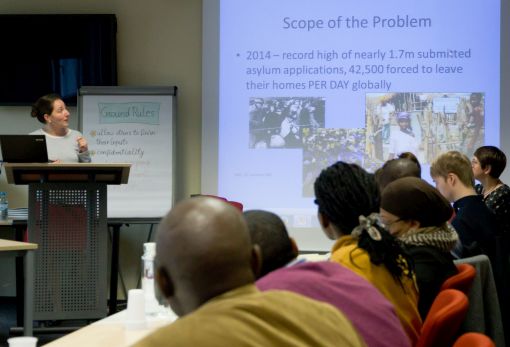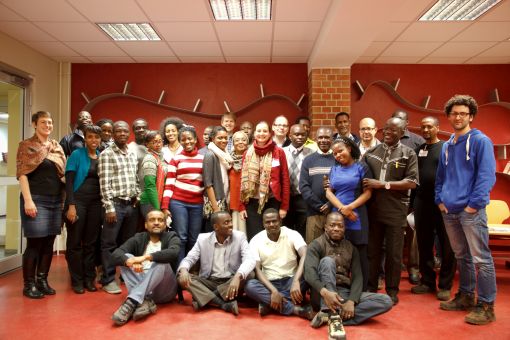Understanding the causes of forced migration – and developing effective solutions – was the focus of the AGEP Winter School held at Otto von Guericke University Magdeburg. DAAD scholarship holders and alumni from Sub-Saharan Africa engaged in lively discussions, and even presented their recommendations to experts at the Federal Foreign Office in Berlin.

In workshops and working groups, participants pooled their expertise to analyse the causes of migration © Doreen Göller
“The majority of Winter School participants are directly confronted with migration because their home countries are often the countries of refugee origin,” says Doreen Göller, Project Coordinator of the Winter School. Hosted by the German Association of Postgraduate Programmes with special Relevance to Developing Countries (AGEP), the goal of the Winter School was to foster dialogue between academics, policy makers and practitioners in countries affected by forced migration.
In workshops and working groups, participants pooled their expertise to analyse the causes of migration. While many African countries are plagued by war and oppression, economic problems and natural disasters are also factors that force migration. Young Eritreans, especially, are fleeing from indefinite military conscription and other violations of their liberty. “There are huge numbers of refugees from Eritrea in my home country Uganda, and I want to help find ways to integrate asylum seekers on the local level,” says social scientist Joseline Namara-Kwesiga. “The discussions in Magdeburg helped me to better understand the complexities of the situation.”
The Winter School sought to probe the causes of forced migration and develop solutions to the associated political and social challenges. The podium discussion “Flucht, Vertreibung, Migration – Welche Verantwortung tragen wir?”, which included a welcome address by Rainer Robra State Minister and Head of State Chancellery for the state of Saxony-Anhalt, made clear that solutions will only be possible if Africa and the European Union can collaborate more closely.

Everyone was very enthusiastic – The participants of the AGEP Winter School at University Magdeburg © Doreen Göller
Berlin diplomats provide feedback
The highlight of the Winter School was the visit to Berlin. At the Federal Foreign Office, participants from the Magdeburg workshop presented their strategy papers and own policy recommendations to the Foreign Office Expert for East Africa and Sudan, and the Spokesperson for Migration. “My team demonstrated how forced migration can be avoided or at least held in check by preventing conflict,” says Namara-Kwesiga. “Writing the strategy paper was a good exercise and something that I can now apply back home in Uganda.” Together with her group, Marian Bondzie-Mensah, a forester from Ghana, developed strategies on how the EU and African Union can strengthen ties and better coordinate implementation of their action measures. “The presentation of our strategy paper in the Federal Foreign Office went very well. We received constructive feedback, which will help us fine-tune and improve our recommendations,” says Bondzie-Mensah.
Looking back, Project Coordinator Doreen Göller is pleased with the results of the Winter School. “Everyone was very enthusiastic and contributed actively to the discussions, which shed light on a diverse range of perspectives,” says Göller. “The participants will take these fresh new impulses and insights back home to their countries and apply them to their own work.”
More information:
AGEP





